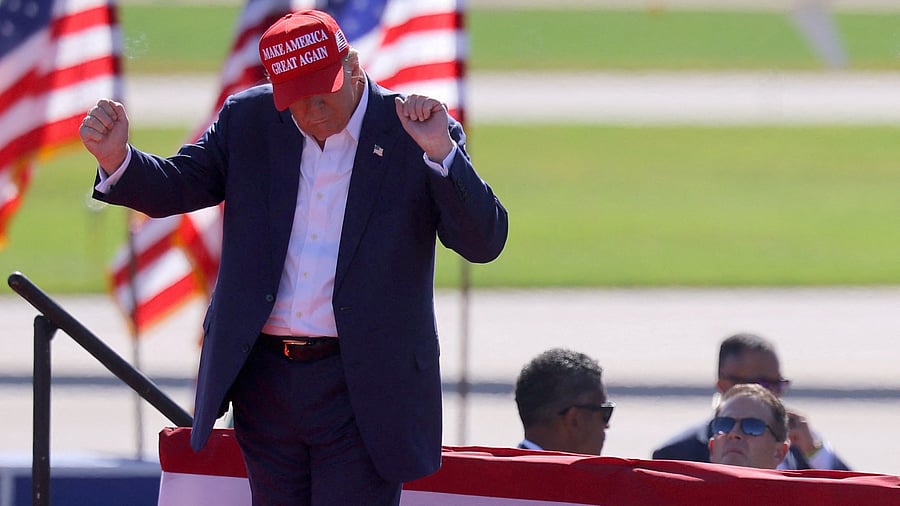
US President Donald Trump
Credit: Reuters Photo
Washington: A divided Senate on Tuesday narrowly passed Republicans’ marquee bill to slash taxes and social safety net programs, as the GOP muscled through deep internal rifts in a bid to deliver President Donald Trump’s agenda.
The 51-50 vote sent the legislation to the House, where its passage was far from certain even though Trump has demanded that lawmakers send the bill to his desk for enactment by July 4. Three Republicans — Sens. Susan Collins of Maine, Thom Tillis of North Carolina and Rand Paul of Kentucky — joined all Democrats in voting against it, forcing Vice President JD Vance to cast the tiebreaking vote.
It came after a brutal slog of debating, voting and negotiating that lasted more than 24 hours, as party leaders worked through Monday and into Tuesday morning huddling with Republican holdouts — particularly Sen. Lisa Murkowski of Alaska.
In the end, she supported the legislation after GOP leaders packed it with sweeteners for her state, including a provision aimed at insulating Alaska from some of the bill’s harshest cuts to health care and food assistance.
The bill would extend roughly $3.8 trillion in tax cuts enacted during Trump’s first term in 2017, provide tens of billions of dollars in new funding for border security and the military, and include versions of the president’s campaign promises to not tax tips and overtime. Republicans hailed it as the legislative pinnacle of their governing trifecta.
“We’re here passing legislation that will permanently extend tax relief for hardworking Americans that will spur economic growth, and more jobs and opportunities for American workers; that will rebuild our military; secure our borders; unleash American energy; and cut waste, fraud and abuse in federal programs,” said Sen. John Thune, R-S.D., the majority leader.
But the product that Republicans are advancing — which Trump has named the “big, beautiful bill” — has caused considerable angst for their rank and file in both chambers, and still faces resistance in the House, which must give it final approval before it can go to Trump for his signature. In the days leading up to the Senate vote, several Republicans publicly savaged the plan before voting to pass it. The process of squeaking it through the chamber was remarkably messy, with Republicans shattering long-standing budgeting rules, cutting side deals and haggling with skeptics until the very last moments.
The Senate vote amounted to a political and policy gamble for Republicans, who embraced the bill despite considerable reservations in their ranks about a measure that would swell the deficit and cut vital federal programs including Medicaid — and that polls show is deeply unpopular with voters. In the end, spurred by fear of crossing Trump and allowing a tax increase to take effect at the end of the year, they rallied around the measure — just barely.
The changes senators made to a version of the bill the House passed in May have raised the cost of the package while also teeing up deeper cuts that would lead to more Americans losing health insurance coverage. That alienated both poles of the party — fiscal hawks concerned about soaring deficits and mainstream Republicans wary of shredding the social safety net — complicating its path in the Senate and threatening its prospects in the House.
It would add at least $3.3 trillion to the already-bulging national debt over a decade, the nonpartisan Congressional Budget Office said Sunday — a cost that far exceeds the $2.4 trillion price of the version passed in the House. And it would result in $1.1 trillion in health care cuts, nearly $1 trillion of them to Medicaid, causing 11.8 million more Americans to become uninsured by 2034, the same office found.
That left little for the detractors of the legislation to champion.
“In deciding whether to vote for the big, not-so-beautiful bill, I’ve asked a very specific question: ‘Will the deficit be more or less next year?’” Paul said. “The answer, without question, is this bill will grow the deficit.”
Other Republicans, particularly those up for reelection next year, were openly wary about a measure they worry could be a political loser and will result in the loss of access to health care and nutrition assistance for their constituents.
As if to underscore the political peril, Tillis abruptly announced during debate on the bill that he would not seek reelection next year, having drawn Trump’s ire for his vocal opposition to it.
“What do I tell 663,000 people in two years or three years, when President Trump breaks his promise by pushing them off of Medicaid because the funding is not there anymore?” Tillis asked on the Senate floor.
“It is inescapable that this bill in its current form will betray the very promise that Donald J. Trump made” to go after only waste, fraud and abuse in the program, he continued.
Collins said that while she backed the extension of the tax cuts, “my vote against this bill stems primarily from the harmful impact it will have on Medicaid, affecting low-income families and rural health care providers like our hospitals and nursing homes.”
That is a key part of the message Democrats plan to trumpet in the midterm elections.
“Today’s vote will haunt our Republican colleagues for years to come as the American people see the damage that is done as hospitals close, as people are laid off, as costs go up, as the debt increases,” said Sen. Chuck Schumer of New York, the Democratic leader. “They will see what our colleagues have done, and they will remember it. We Democrats will make sure the American people will not forget the betrayal that took place today.”
The legislation would slash taxes by a total of $4.5 trillion, including through an expanded child tax credit, a larger standard deduction for some older Americans and one for buyers of new cars made in the United States.